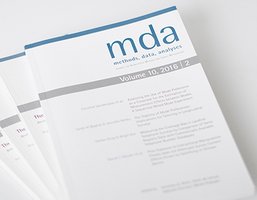methods, data, analyses (mda), Vol 17, No 1 (2023)
The first mda issue of the year contains five research reports and one research note which explore questions around samples and online studies.
The usage of data from the internet for sampling has led to an increasing interest in non-probabilistic selection methods. Alexander Murray-Watters and his colleagues therefore report on a case study of river sampling. Sven Stadtmüller and his co-authors also deal with sampling methods. In their paper, they test a Deutsche Post database as a framework for drawing address samples.
Caroline Marjanne Menken and Vera Toepoel from the University of Utrecht examine various aspects of optimising online mixed-device surveys in their research report. Bastiaan Bruisma subsequently evaluates the measuring of the congruence between voters and parties in online surveys, and in particular the role of question wording. In another research report, two Australian researchers (Sebastian Kocar and Nicholas Biddle) address the question of whether mixed-mode surveys should be used to increase the accuracy of results from online panels. Finally, in his research note, Andreas Quatember from the University of Linz gives suggestions for empirical researchers on how practical relevance can be taken into account in estimates.
The mda has expanded its editorial board in 2023, both to accommodate the increased number of submissions and to broaden the focus of the journal to new, empirically relevant topics such as statistical learning and computational social science. There are currently 14 international experts working as associate editors, with two more joining in summer 2023.

